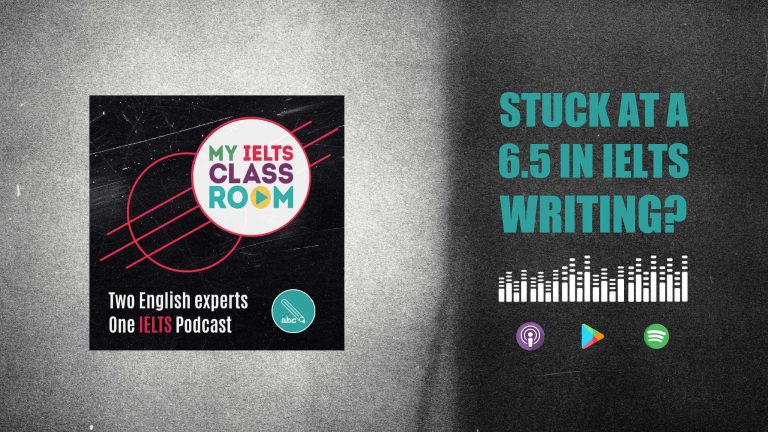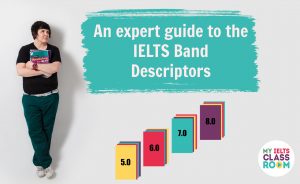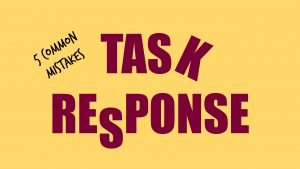
Why are so many students stuck at a 6.5 for IELTS writing?
Welcome to My IELTS Classroom podcast. Today, Nick and I discuss one of the most important IELTS questions – why are so many students stuck at a 6.5 for IELTS writing? Is it because there is a conspiracy to trick test-takers, or are there other less sinister reasons?
This is a Patron Only Episode: Click here to support the show and gain access to the audio or continue reading about why students are stuck at a 6.5 in the blog post below

https://www.patreon.com/myieltsclassroom
Below, you can find a summary of the episode, which includes all of the links to useful materials and the times of each part of the discussion (so you can go directly to the part you want to listen to).You can also find every free episode of the podcast here 🚀
Subscribe to My IELTS Classroom podcast on Apple podcasts here
Subscribe to My IELTS Classroom on Google podcasts here
Podcast Summary: Why are so many students stuck at a 6.5 for IELTS writing?
00:00 – 03:46 Introduction (and a discussion of the pyramids!!!)
03:47 – 12:58 Could IELTS really be changing students’ writing scores so that they cannot achieve a 7.0 in writing?
In short, no! However, let’s look at every part of the IELTS system to see 1) if it is possible that they could change students test scores and 2) if they really have the motivation to do so!
- Cambridge Assessment English: As we have discussed in previous episodes, all that Cambridge Universty does is create the exam papers. They have no involvement at all in the marking of the tests. Innocent!
- British Council / IDP: These are the two organisations who oversee the running of the tests. Literally, hundreds of people are employed here to ensure that the tests are administered correctly, and all examiners receive the same training. Therefore, any “policy” to purposefully change student scores would be known by so many people that it would be almost impossible for it to be kept a secret. Also, if there was this policy, those involved would probably be arrested as IELTS is used by governments to make serious visa decisions. Innocent!
- Examiners: This is the easiest one – there are TWO examiners who mark your writing. One for Task 1 and one for Task Two. They don’t meet, they don’t discuss your marks, and they have literally no control over your final score. Innocent!
- Administrative staff at your test centre: OK, this is the ONLY plausible place in the IELTS eco-system where I think that corruption could occur. However, just because it is possible, it does not mean that it is likely! Is it possible that a member of staff at the test centre could change an examiner’s score to make you fail? Yes – I guess it is. Is it likely? Absolutely not. For a start, every step of the process is heavily regulated to stop this type of behaviour. Also, because students can ask for an EOR if they are unhappy with their results, this behaviour would be detected very quickly (because the British Council or IDP would see that results were reportedly too low) and the test centre would lose its license. 99.9% Innocent!
Discover the secret to writing a Band 7.0+ essay
Then download a copy of our FREE e-book, which explains the most common errors made by test-takers and how you can avoid them. Just click here for your copy.

12.59 – 20:55 Why do students often get a lower score in writing than the other three parts of the test?
So, based on the arguments above, I think it is just much more likely that students receive a lower score for writing than the other parts of the exam for the simple reason that their writing is not quite at the same level as the other three skills. And, honestly, this makes a lot of sense to me if you consider these factors:
- Writing is not taught / practised as much in class as the other skills. I have spent years teaching general English in language school around the world and I can honestly say that writing look up less than 5% of my course curriculum. In fact, more often than not, it was something that I used to give the students for homework. Obviously, this was not true in the classes that I taught / teach in universities, but those were English for Academic Purposes courses, so a lot of focus on writing was expected.
- This brings me to my second point – even when writing is taught, it often focuses on day-to-day writing tasks such as writing a post card or a simple work email rather than genuine academic writing skills. Very rarely do books include comprehensive lessons on how to write an academic essay unless they are preparing students for a particular exam (i.e. FCE, CAE, etc). I have taught every major Oxford, Cambridge, Pearson, and Macmillan book and I can’t think of one that teaches how to write topic sentences, or reference or build paragraphs. In other words, very few students have a real knowledge of academic writing before they start preparing for IELTS.
- Also, students have very little chance to practice writing outside of the classroom. Today, there are so many free online resources that allow you to practice listening and reading at home. Who hasn’t watched a TED talk lecture or a TV series on Netflix, or read an article from the Economist or the Guardian? These are things that many ESL students do every day without even considering it “study”. Writing though is completely different. There is no real way to practice this. And, even if you do some words during the day in a text message, I doubt you are using formal academic language!
However, the best argument that I can offer to prove that IELTS test centres are not changing scores is my own experience. When students join my school, they have the option of adding marking to their video course. Those students who join my Silver or Gold Writing Packages, have the chance to send me an essay that I will analyse for free. This gives me a chance to find out the student’s level before they start the course and know which lessons I have to ask them to watch to start their preparation with me.
I can honestly say that students hardy ever send me an essay that would satisfy the public band descriptors for their first assessment.
So, if you are currently “stuck” at a 6.5, I strongly recommend that you accept it is much more likely that it is because your writing is not quite good enough than that there is a global IELTS conspiracy. If you can do this and start working on improving your writing, it will not only help you to improve more quickly, but it will also be a lot less stressful! And to help you, Nick and I are going to tell yo u the most common errors that we see each week that are preventing people getting a 7.0.
20:56 – 22:06 Introduction to Task Response

22.07 – 31:35 Shelly’s biggest Task Response problem: Not addressing the question
There are two ways that students can fail to address the task
- by failing to complete each part of the task they were given
- by failing to address the topic of the task.
Let’s start by looking at the first. Students get really stressed about what exactly they have to do to answer each type of IELTS question, but there is just one simple answer – just do what IELTS asked you to do! For example, one common question is “Discuss both views and give your own opinion”. Therefore, to address this task, it is vital that you do all three of these things.
For example, imagine if you were given this simple question: Some people think Shelly is the best IELTS teacher. Others believe that it is Nick.
If you wrote these paragraphs
- BP1 – Shelly is boring (= NICK IS BEST)
- BP2 – Nick is interesting to watch (= NICK IS BEST)
Then you have NOT discussed both sides because you have only given me arguments for why Nick is the best. Remember that one of the views is that I am the best, so you MUST offer some arguments in favour of me! In fact, you can have both of these arguments, but they both belong in the SAME PARAGRAPH (the one with arguments in favour of Nickl)! You would also need two ideas for the opposite view to address the task fully:
- BP1 = Shelly has a lot of experience / Shelly can explain things clearly (= SHELY IS BEST)
- BP2 = Nick is interesting / Shelly is boring (= NICK IS BEST)
Do you see the difference? If you only give negative arguments for one view, you are not discussing it. Remember, you are not asked to discuss two TOPICS (shelly and Nick), you are asked to discuss two VIEWS (Shelly is the best, Nick is the best). You can read more about this type of problem here.

Discuss both sides questions are not the only ones that causes problems. I often see issues with problem / solution essays. This is because there are three things you can be asked to do in this type of essay:
- explain the cause of a problem
- describe a problem
- provide a solution
However, you are rarely ever asked to do all three in an essay. You are usually only asked to do two things. Usually it is 1 and 3 (explain the causes and give some solutions) BUT NOT ALWAYS! I have marked many exam papers where student gave me solutions for a problem even though they were not asked to provide any! If you do this, your essay will be off-topic, so read the question carefully.
However, if you prepare properly for IELTS it will be almost impossible for you to make one of these basic errors. For example, I can happily say that no student I have ever trained has failed to correctly address the question. However, sadly, a number of students I have worked with have failed to address the TOPIC of the essay properly. This is because:
- they misunderstand the question. This happens when students read the question too quickly or d not understand a key piece of lexis. The most commonly misunderstood question in the history of IELTS is this one: Some people believe that nowadays we have too many choices To what extent do you agree or disagree with this statement? That’s because people don’t realise that “too many choices” doesn’t mean “a lot of choice” but that “this choice is a bad thing”. As a result, they just write an essay that describes all of the choice that we have rather than one that evaluates if that choice is a good or a bag thing. Still confused? You can read more about it here.
- they don’t address every part of the question. Some IELTS questions are long and include a number of factors that you must discuss. If you ignore any part of a question, you will receive a low score for Task Response. I once had a fantastic student who got a 7.5 for writing in her second attempt. However, I will always remember her disappointment at getting a 6.5 the first time because when she was given this question, she failed to discuss individuals at all: Individuals and private companies should pay to clear up pollution and not the government. To what extent do you agree or disagree?
31:34 – 35:40 Nick’s biggest Task Response problem: not expanding your ideas enough
It is really important that you extend the ideas in your essay. One simple rule that will help you to this is to never have a single-sentence argument. In other words, every time that you give an idea, you must write one more sentence to explain it. Asking yourself the questions “how” or “why” can really help you to naturally extend your ideas.
Also, you don’t need an example to support every argument. I would recommend that you have only ONE per paragraph and just having one in the whole essay is totally fine. I have written a lot about writing good examples in this blog post.
35:41 – 37:24 : Introduction to Coherence and Cohesion
37:25 – 40:55 Nick’s biggest Coherence and Cohesion problem: not having clear topic sentences
One of the main criteria in the band descriptors for IELTS Coherence & Cohesion is having a clear central topic in each paragraph. The way to signal to the examiner what the main idea in your paragraph is to start with a sentence that clearly states what you are going to discuss i.e. the topic sentence. So, what does a good topic sentence look like? Well, that will depend on the type of essay you are writing.
If you are writing a paragraph that contains TWO arguments i.e. a discuss both sides essay, a problem / solution essay, or an advantages / disadvantages essay then you just need a GENERAL topic sentence that lets the examiner know the main idea of the paragraph. However, many students don’t do this. Instead, they start their paragraphs by giving their first argument.
Why is this a problem? Well, if your paragraph has two arguments then your “topic sentence” will only cover half of it! Remember you are giving two arguments that are united by the general idea. For example:
- On the one hand, it could be argued that sportsmen’s salaries are too high (e.g. this paragraph will contain two reasons why some people think this)
- On the one hand, there are several factors that lead to a person being obese (e.g. this paragraph will contain two causes)
- On the one hand, there are a number of advantages to working from home (e.g. this paragraph will contain two advantages)
So, remember, if you are going to discuss two arguments inside one paragraph (which is often a good idea) then make sure your topic sentence is general. You can read more about writing good topic sentences here.
40:56 – 46:50 Shelly’s biggest Coherence and Cohesion problem: mechanical use of cohesive devices
I would say that this is the most common problem that I see when marking student’s first assessment essay. It is a common misconception that to score highly in IELTS, you need to start every sentence with a transition signal – this is not true! This is what the band descriptors refer to as “mechanical use of cohesive devices” and always results in a 6.0 or less. Take this paragraph, for example. It contains far too many transition signals and would be greatly improved by removing “To elaborate” and “Moreover’.
Firstly, there are a number of social problems for those who live in a country with a different first language.
To elaborate,It is hard to make friends when you are not able to communicate fluently.Moreover, this is because people generally like to spend time with those they can share their thoughts with, or who they can turn to for advice, or who simply make them laugh. However, this is hard to do when your language skills are weak.
Also, notice how this starts with “Firstly”. That is totally fine. I have been told by so many students that they were told that using “Firstly” automatically results in a 6.0 for C+C. This is totally preposterous and the type of false rumour that drives me crazy! What examiners are looking for is how you generally join your sentences – there are no blacklisted words! The key is using not too many and not too few!
47:13 – 48:44 Introduction to Lexical Resource

48:45 – 57:39 Nick’s biggest Lexical Resource problem: poor paraphrasing
This is by far the most common problem I see and the one that has the most damaging effect on a student’s score. I think that most of the time poor paraphrasing is born from one simple misconception: you can never repeat words in IELTS. This is not true!
Yes, there are times when paraphrasing is great and will definitely boost your Lexical Resource score, but not every word in English has a good synonym and very few have two or three! Take this task for example, I have seen so many good essays ruined because students have tried to find synonyms for the underlined words.
Some people believe that all children should learn a foreign language from the time they start school, while others believe it is better to wait until a child is at secondary school. Discuss both sides and give your own opinion
For example, you cannot use “at the secondary phase” or “at the mid-level” to paraphrase “secondary school”. In the same way, “young ones” is not a suitable paraphrase for “a child” and “novel medium of communication” cannot be used to replace “foreign language“.
It would be much better to use the words from the text than these confusing “paraphrases”. Often, it is the verbs in a task that can be paraphrased best, not the nouns. For example, in this question you could change “start” to “begin” or “enter”.
How do you know if your paraphrase is good or not? Well, imagine using it in a sentence when you are talking to a friend. Would they understand you?
Hey! My daughter is at the mid-level and so is gong to the secondary phrase”
No? Then just use the words from the task! You can read more about how to use lexis accurately here.
57:40 – 01:00:06 Shelly’s biggest Lexical Resource problem: fake transition signals
Because weaker students know that it takes a long time to learn topic-specific vocabulary, they also wrongly think that if they can trick the examiner by leaning some clever and rarely used transition signals to boost their lexis score.
However, cohesive devices are standard expressions that have been used for centuries. While some slang words may come in and out of fashion, transition signals never change, so trying to use a “new” one will not increase your score – it will only damage it.
Here are some of my “favourite” fake transitions (and to be clear, when I say “favourite”, I mean the absolute worst!). Please NEVER use any of these (or any others that your teacher has “invented” to increase lexis your score)!

01:00:40 – 01:0:39 Introduction to Grammatical Range and Accuracy
01:01:39 – 01:05:34 Shelly’s biggest Grammatical Range and Accuracy problem: not having a wide enough range of sentence structures
Examiners can only “pay” you for a sentence structure once, so there is no point repeating the same type of grammar again and again. You won’t lose marks for this, but if you have three result relative clauses in your essay and no other complex sentences, then you are likely not to have the range needed for a 7.0.
Although we never want to “force” grammar structures into an essay, we have to make sure that we show the examiner our full potential. This means that you need to be mindful of the language you are using. Why not have a look back at some of your essays now to see if you are showing a wide enough range of sentence structures. Are you really showing the examiner everything that you are capable of, or are you using the same sentence structures again and again?
01:05:35 – END Nick’s biggest Grammatical Range and Accuracy problem: poor subject / verb agreement
Obviously the main problem students face with grammar is being able to construct sentences that are error-free. Yes, you have studied the rules for months, maybe even years, but putting all of that information together in the exam room can be difficult. It is especially difficult when you are also focusing on addressing the question, joining your ideas and having a wide range of lexis!
One common error even for high-level students is having subject / verb agreement. In English, it is really important that the subjects of our sentences agree in person and in number with the verbs/nouns that we use. If this is a new concept for you, then have a look at my free blog lesson to learn more.
Other common problems areas for accuracy are articles and contrast clauses, but if you are unsure which parts of your language you need to work on, why not take my free IELTS grammar test to locate your weak areas today.


